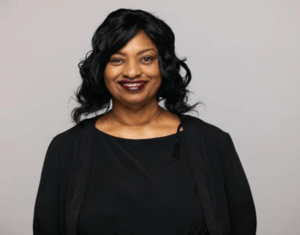By Anne-Marie Green, Director of Digital Communications
 As a 19-year veteran educator, Dr. Barbara Dunham’s learning instincts were set in motion when she was diagnosed with neuroendocrine carcinoma. She felt compelled to fully educate herself about the disease and share her knowledge and experience widely to help others. Armed with a friendly and upbeat demeanor, she has transformed daunting circumstances into a mission of hope and advocacy.
As a 19-year veteran educator, Dr. Barbara Dunham’s learning instincts were set in motion when she was diagnosed with neuroendocrine carcinoma. She felt compelled to fully educate herself about the disease and share her knowledge and experience widely to help others. Armed with a friendly and upbeat demeanor, she has transformed daunting circumstances into a mission of hope and advocacy.
An Educator’s Mindset
Barbara spent nearly two decades inspiring students as a STEM educator and computer science instructor in Alabama. Her professional background also included roles as a departmental secretary at an insurance company, patient advocate for student health, and as a Medicaid screener—experiences that proved invaluable as she has confronted her own health challenges.
A Life-Altering Diagnosis
In February 2023, what seemed like routine stomach problems led to an alarming discovery. Living with multiple health conditions including diabetes, GERD, and a hiatal hernia, she initially attributed her severe abdominal pain to known conditions. But her internal medicine physician, Dr. Morris Roebuck, did not rush to any obvious conclusions.
“He’s not that kind of physician,” she explains. “With him, he has to know what’s wrong. He ran tests because he wanted to positively tell me what happened.”
Dr. Roebuck’s thorough approach revealed elevated liver enzymes, leading to a CT scan that discovered two tumors. The diagnosis: high-grade neuroendocrine cancer in her liver, with multiple metastases.
Seeking Knowledge and Community
Faced with an uncommon cancer that her Alabama oncologist had treated in only about 11 patients, her desire to learn kicked in—she needed to completely understand her disease. This drive led her to her first neuroendocrine tumor education conference at MD Anderson Cancer Center in 2023, where she began building a network of hope.
A pivotal conversation with a fellow patient at the conference offered a crucial perspective. “She told me, ‘I’ve had stage four for 24 years,'” she recalls. “Meeting her, talking to her, was such a relief—to know that there’s hope. I have stage four, but I don’t have to die because I have stage four.”
Finding a NET Specialist and the Right Treatment
Barbara’s journey eventually led her to Dr. Mary Maluccio at LSU LCMC Health Cancer Center, where she underwent specialized procedures that dramatically changed her prognosis. After the first treatment, her larger tumor shrank by 42% while the smaller one reduced by 37%. Following the second procedure, the results were even more remarkable: the larger tumor was now down by 51% and the other had shrunk from centimeters to millimeters. “They’re calling them lesions instead of tumors now,” she says, still amazed by the transformation.
Becoming an Advocate
Now retired from teaching due to treatment demands, Barbara has channeled her educator’s passion into patient advocacy. She participates in cancer support groups, connects with other neuroendocrine cancer patients, and works to raise awareness about a disease that often goes misdiagnosed.
“I’ve tried to become an advocate for this illness because there’s not enough information out there,” she explains. Her message to fellow cancer patients reflects her fundamental philosophy: “We have cancer. Cancer doesn’t have us.”
Why She Gives Back
Despite ongoing treatment challenges and the reality of living with neuroendocrine cancer, Barbara embraces the present with an eye toward the future—supporting research that could lead to better treatments and eventual cures. Her support for NETRF stems from a deep belief in the power of research and education.
“My hope and my dream and my prayers are that there will be more education so it can be caught earlier for more people, and that research will lead to a cure,” she says.
Barbara is unwilling to let her diagnosis define her or her future. With her uplifting attitude, volunteerism, and advocacy, she is helping to move research, and our whole community, forward.
Join us in funding the next research breakthroughs. Support our anniversary campaign: Breakthroughs Today, Cures Tomorrow.
